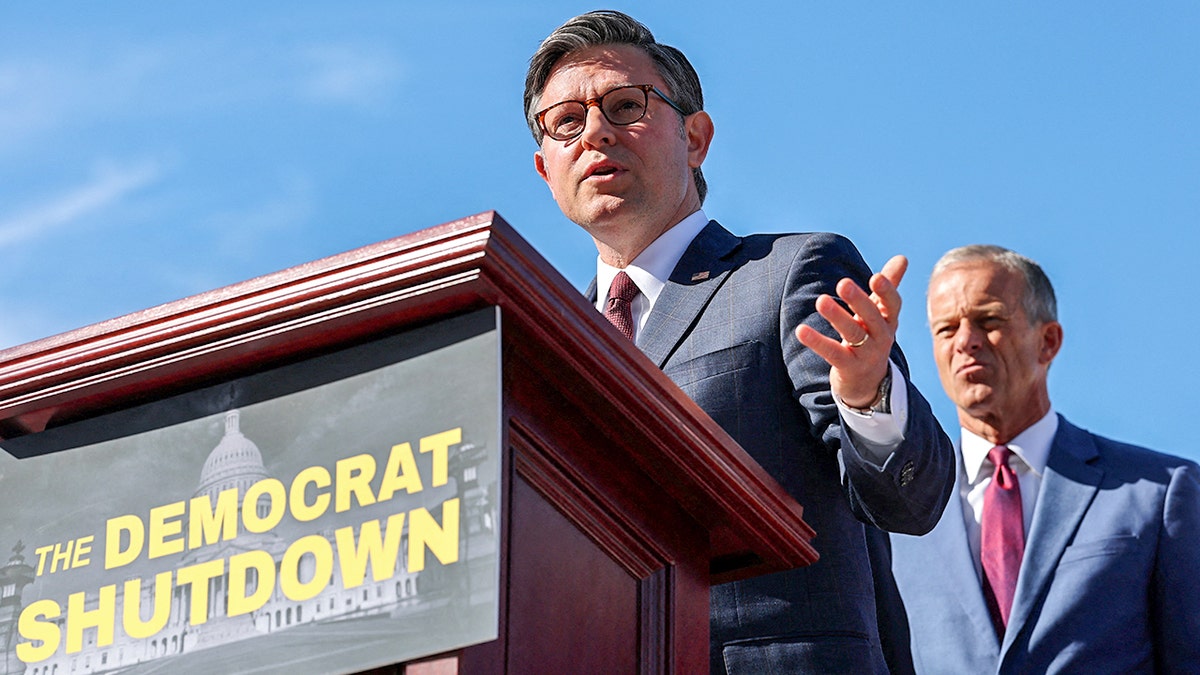
In a blistering statement delivered from the U.S. Capitol, House Speaker Mike Johnson (R-La.) accused Senate Minority Leader Chuck Schumer (D-N.Y.) of intentionally prolonging the ongoing government shutdown to coincide with a left-wing rally in Washington, D.C.
Johnson revealed that the Democrats are reportedly withholding a vote to reopen the government until after the “No Kings” rally on October 18, which is expected to feature pro-Hamas and Antifa supporters.
According to Johnson, Democratic leaders are prioritizing the interests of their left-wing base over the well-being of everyday Americans, using the shutdown as leverage to appease political factions that are demanding their attention.
In particular, Johnson took aim at Schumer’s alleged strategy of waiting until the rally is held before agreeing to negotiate a resolution to end the government shutdown.
“They have a Hate America rally scheduled for October 18 on the National Mall,” Johnson remarked. “Pro-Hamas, Antifa people, they’re all coming out. House Democrats are even selling T-shirts for the event.”
His criticism of the Democrats' decision to delay a government reopening after the rally reflects growing frustration among Republicans, who are accusing Democrats of using the shutdown as a political tool.
According to Johnson, the Democrats’ refusal to reopen the government stems from their fear of upsetting their more radical supporters, who expect them to resist Republicans at every turn.
Johnson’s remarks come as the government shutdown enters its 13th day, with no immediate resolution in sight. While some federal workers have been furloughed and others are working without pay, Johnson and many of his Republican colleagues have pointed to the Democrats’ refusal to negotiate as the main reason for the continuing deadlock.
The House Speaker also criticized what he described as “unserious” proposals from the Democrats, including the use of taxpayer funds for international programs that Republicans believe are wasteful and unnecessary.
The $24.6 million earmarked for climate resilience projects in Honduras and the $13.4 million for civic engagement in Zimbabwe are just two examples of what Johnson sees as misplaced priorities.
He pointed out that $3.9 million was being proposed for democracy grants in the Western Balkans, while another $2.9 million was designated for desert locust risk reduction in the Horn of Africa.
Additionally, $2 million was allocated for “organizing for feminist democratic principles” in Africa. For Johnson and many Republicans, these foreign aid initiatives represent a misuse of U.S. taxpayer dollars when the government shutdown has caused significant hardship for American families.
“This is the kind of nonsense that Democrats are proposing,” Johnson asserted. “We’re not doing that. These are unserious proposals from unserious people, and they are playing games while real Americans are being harmed by the shutdown.”
His comments reflect growing frustration with what many Republicans view as Democrats’ unwillingness to focus on domestic issues amid the ongoing shutdown.
Johnson’s remarks also underscore a key element of the Republican critique of the shutdown: the belief that the Democrats are more focused on appeasing their radical base than on resolving the real-world problems caused by the funding gap.
The political fallout from the shutdown and the Democrats' role in its continuation has been swift. On Thursday, the White House responded sharply to comments made by Schumer, who had remarked that the shutdown was “getting better” for Democrats.

Schumer’s comment, which was widely criticized, highlighted the growing political divide between the parties as the shutdown drags on. It also underscored the partisan nature of the ongoing budget impasse, with both sides accusing each other of prioritizing political maneuvering over the well-being of the American public.
Meanwhile, the political dynamics around the shutdown are becoming increasingly complex. Treasury Secretary Scott Bessent weighed in on the situation, criticizing the “No Kings” rally and its connection to the ongoing government shutdown.
He warned that the rally would result in “no paychecks, no government,” reflecting the reality of the situation for many federal employees who are caught in the middle of the political deadlock.
Bessent’s comments suggest a growing concern within the administration that the shutdown is not just a political issue but one with serious consequences for the functioning of the federal government and the lives of American workers.
In the Senate, Pennsylvania Senator John Fetterman, a member of the Democratic Party, voiced his own frustration with the ongoing shutdown. Fetterman, who has previously criticized both parties for their handling of the budget impasse, expressed concern that the shutdown was sending the “wrong message” to the American public and the rest of the world.
“Shutting our government down. That’s the wrong message for the world, for Americans as well,” Fetterman said. “It’s not about a blame game. It’s about opening this government, having this conversation, and literally let’s address these kinds of healthcare issues as well too.”
Fetterman’s comments indicate a level of internal division within the Democratic Party over the shutdown. While some members of the party, particularly those aligned with Schumer and the more left-wing factions of the party, are willing to play the long game and wait for the rally, others like Fetterman are eager to find a resolution to the shutdown as quickly as possible.
His insistence on moving past the blame game and addressing issues like healthcare tax credits highlights the challenges faced by Democrats in navigating the competing pressures within their own ranks.

Fetterman also emphasized that the real losers in this situation are the American people. “The losers are these poor Americans here that are going to get caught in the middle of this thing,” he said, referring to the economic hardship caused by the shutdown.
His remarks reflect a growing concern within the party that the prolonged government closure is hurting vulnerable Americans, particularly those who rely on government services and benefits.
The ongoing stalemate has placed many Americans in a difficult position, with federal employees uncertain about their pay and critical government services delayed or suspended.
At the same time, both Republicans and Democrats are using the shutdown as a political tool, hoping to extract concessions from the other side. The result has been a prolonged crisis that has done little to resolve the underlying issues but has certainly contributed to the polarization of American politics.
For now, it seems unlikely that the shutdown will end anytime soon. With Schumer and the Democrats reportedly unwilling to act until after the “No Kings” rally, and with Republicans blaming them for the closure, the impasse shows no signs of breaking.
As the days drag on, the political consequences of the shutdown will continue to mount, with both parties facing increasing pressure from the public to find a solution.
In the end, the timing of the rally and the decisions made by Democratic leaders could have a lasting impact on both the shutdown and the broader political landscape.
If the government remains closed until after the rally, it could be seen as a victory for the left-wing activists who have pushed for the delay. However, if the shutdown continues and the public grows more frustrated with the gridlock, it could backfire, further eroding trust in the political establishment and deepening the divide between Republicans and Democrats.

The future of the shutdown remains uncertain, but one thing is clear: the stakes are high for both parties, and the political fallout from this crisis will be felt for months to come.
For now, Speaker Mike Johnson’s comments serve as a sharp critique of the Democrats’ handling of the situation, while highlighting the ongoing challenges facing the American public as they navigate the consequences of this prolonged political standoff.




